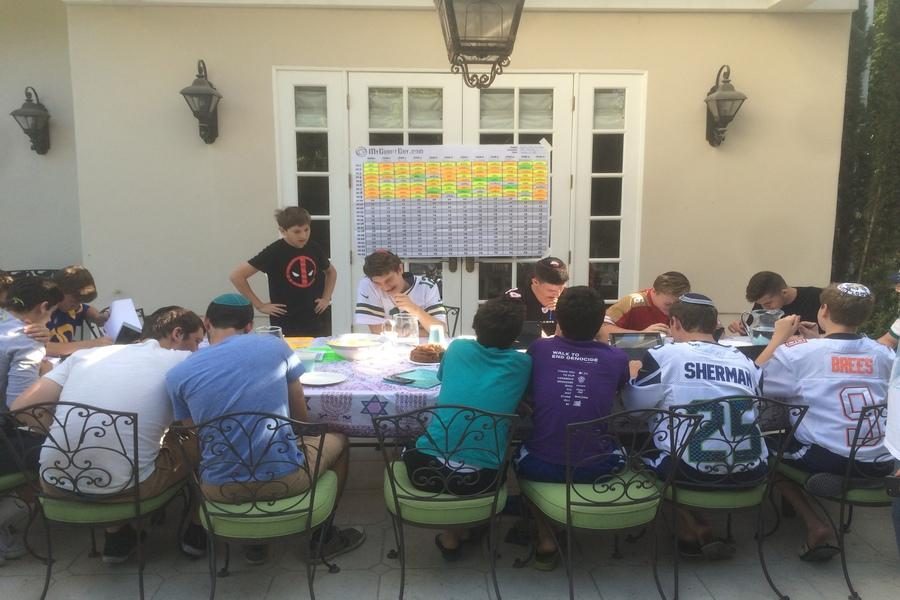‘Sweet Agony’ of Fantasy Football lures students anyway
GATHERING: Boys in the Just Community League congregated at Alec and Jordan Fields’ house for the Fantasy Football draft Sept. 4. They were encouraged to wear their favorite players’ jerseys.
Competition, anxiety and many lost hours of homework are all hallmarks of Fantasy Football, but it seems students at Shalhevet have fallen for it as hard as the rest of the country.
Once an activity whose members gathered on Sundays around the living room TV with magazines, notepads and pizza, Fantasy Football has become a multi-platform online enterprise.
At Shalhevet, it’s a popular and captivating activity among all grade levels.
“It makes [watching football] lot more exciting,” said sophomore Yakir Kanefsky. “Every player becomes more significant, and all the different plays become more significant. So it’s a whole new experience of football.”
In Fantasy sports, groups of participants create imaginary teams made up of players in actual leagues. Then they score points according to the performance of their players in actual pro games that week.
In a Fantasy league, two teams are matched up weekly, and by the end of the week, whichever team has the most points wins. The football version started in 1988 with 500,000 people, and has now grown to approximately 57.4 million.
But the pastime has other dimensions as well.
“I love fantasy football and it’s super entertaining, but I think if anything it’s made my football experience probably a little more materialistic and something not that genuine,” said senior Alex Silberstein, who runs one of several leagues at Shalhevet.
“I think it’s actually impacted it pretty negatively,” Alex said. “I tend to objectify players. For example, yesterday, I was happy when Danny Woodhead tore his ACL because I have Melvin Gordon on my fantasy team.”
Fellow senior Jonah Kaye describes his involvement as “sweet agony.”
“When my players do well it’s very satisfying, but it’s also a huge time suck,” said Jonah.
There are many leagues in the school, each with its own set of rule, prices and social components. Some have high entry fees, and there are rules about adding and cutting team members, similar to the waiver system in pro sports.
In Shalhevet’s Just Community League, there are high stakes and high payouts. Alex Silberstein runs it as commissioner, with seven other seniors and four juniors.
“I think it’s a great way to interact,” Alex said, “The junior-senior relationship is very important and we’ve become better friends, to say the least.”
For fellow senior and league member Bennett Schneier, the social aspect is a primary focus.
“I started playing Fantasy Football because I didn’t know football and I felt that was a big social handicap in male circles,” said Bennett. “I started for social reasons and I started to really like football.”
Ninth graders said it helped them get to know one another.
“I think fantasy football was a great way … to break the ice in the first couple days of school,” said freshman Harry Diamond, a member of the all-freshman Shalhevet 2020 League. “Though making waiver decisions is stressful, I think it’s a great way to combine football with a social aspect,.”
“It’s like a buy-in to a whole different friend group,” said senior Jonah Kaye.
Still, most players seemed to have a conflicted relationship with fantasy football. Many members described it as time-consuming and somewhat frustrating.
“It’s a very agitating experience,” said Bennett. “The game is so fickle and unpredictable and it’s futile that you’re trying to predict a game that’s appeal is that it cannot be predicted.”
And while being in even one league can be difficult, some Shalhevet students are in multiple leagues. Some watch games every Monday, Thursday and Sunday.
Sophomore Ari Reder is part of three leagues, and spends much of his spare time editing his lineups and doing research for upcoming fantasy match-ups.
“During school if I go to Hashkama and I have a break,” said Ari, “or I finish my lunch and I don’t have any homework to do, usually I look at my fantasy team and look up people’s match-ups and see if I want to take any of my players out.”
Sophomore Asher Dauer started a Fantasy Football club that meets at lunch to help out students with their fantasy leagues.
Students come “not only to get advice but to take part in a civilized environment where people can just talk about their fantasy football teams, news, how their teams played that week, who they want to pick up and who they think is going to play well,” Asher said.
Another challenge is that fantasy football is not free. The average adult in a fantasy league paid an average of $184 per league in 2016, according to the Fantasy Sports Trade Association .
Shalhevet’s Just Community League has an $80 entry fee. The grand prize for winning the most matchups throughout the season is $500, $150 for second place and $50 for third. There are also $10 weekly payouts to the highest scorer.
The sophomores’ league has a $60 membership fee. The 2020 League charges $10.
“Eighty dollars in the scheme of four months is not nothing, but it’s not a big expense,” said Bennett. “It provides incentive for teams to not tank or give up. I know my parents won’t get upset at me if I lose.”
There’s also the question of whether this is all legal, since all of the players at school are under 21.
Under California law, “A person under the age of 21 years shall not do any of the following: Play, be allowed to play, place wagers at, or collect winnings from, whether personally or through an agent, any gambling game.”
However, the Unlawful Internet Gambling Enforcement Act of 2006, signed by President George W. Bush, seems to have legalized fantasy sports.
The law states that if in any online contest “All winning outcomes reflect the relative knowledge and skill of the participants and are determined predominantly by accumulated statistical results of the performance of individuals (athletes in the case of sports events) in multiple real-world sporting or other events.” it is not considered gambling.
Knowledge, effort and skill do seem to be factors. Players said it takes a huge amount of dedication to win.
And according to Bennett, whatever else students join for, winning actually is part of the goal.
“I really want to win,” Bennett said. “There’s not a lot of things in your life that you can point to and say you’re better than your friends at something, and this is one of those things.”

Jacob Joseph Lefkowitz Brooks was editor-in-chief during the 2019-20 school year and is now a student at the University of Toronto.

